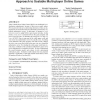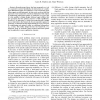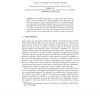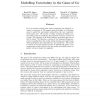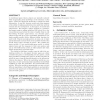1632 search results - page 46 / 327 » Modeling billiards games |
NETGAMES
2004
ACM
15 years 3 months ago
2004
ACM
Today’s Multi-player Online Games (MOGs) are challenged by infrastructure requirements, because of their server-centric nature. Peer-to-peer networks are an interesting alternat...
CDC
2009
IEEE
15 years 2 months ago
2009
IEEE
—Recently, game theory has been proposed as a tool for cooperative control. Specifically, the interactions of a multiagent distributed system are modeled as a non-cooperative ga...
FORMATS
2006
Springer
15 years 1 months ago
2006
Springer
We add freeze quantifiers to the game logic ATL in order to specify real-time objectives for games played on timed structures. We define the semantics of the resulting logic TATL b...
NIPS
2004
14 years 11 months ago
2004
Go is an ancient oriental game whose complexity has defeated attempts to automate it. We suggest using probability in a Bayesian sense to model the uncertainty arising from the va...
SIGECOM
2006
ACM
15 years 3 months ago
2006
ACM
In traditional game theory, players are typically endowed with exogenously given knowledge of the structure of the game—either full omniscient knowledge or partial but fixed in...
